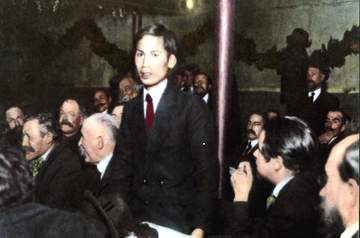This year, Vietnamese people and peace lovers throughout the world celebrate the 95th anniversary of the foundation of the Communist International (the Comintern) – Third International - and continue to affirm its values to the world’s communist and labour movement. Just like the previous years, at this time, anti-socialists repeat their “rhetoric”: the Comintern has come to an end with the collapse of socialism in the Soviet Union and East Europe. Many of them who used to be members of Communist Parties and grow up in the International Communist and Labour Movement claim that they have “chosen the wrong road”. As for true communists, the Comintern still demonstrates its necessity, vitality and vigour in the contemporary world.
 |
|
Nguyen Ai Quoc at the founding ceremony of the Communist Party of France |
It should be noted that the foundation and existence of the Comintern are associated with the struggle to affirm, protect and promote Marxism’s values in the reality.
During 24 years of existence and development, the Comintern held 7 congresses, through which the revolutionary struggle of International Communist and Labour Movement increasingly progressed and matured. Thenceforth, a number of Communist and Workers Parties were founded in countries all over the world, directly leading and developing the International Communist and Labour Movement in each country.
The Comintern has comprehensively developed the national-colonial question on the basis of mapping out the revolutionary road for colonial and dependent peoples, as well as the need for coordinating actions between International Communist and Labour Movement and the struggles for national liberation. Karl Marx’s slogan, “Proletarians of All Countries, Unite!”, was then changed to “Workers and Oppressed Peoples and Nations of the World, Unite!”. Although there were times when the proletariat suffered from temporary failure due to sabotage and division made by leaders of social-democratic parties, the Comintern did not lose but unceasingly enhanced its credibility. There were 10 Communist Parties joining the Comintern in 1919. Within 2 years, this number increased to 48 in 1921. By early 1930, national liberation movements were further developed and expanded in Northeast Asia, Indochina and South Asia. The Communist Party of Vietnam was founded on 3 February 1930 and soon became a Communist branch of the Communist International (in April 1931). Thenceforth, Vietnamese revolution merged into the mainstream of the world revolution. Nguyen Ai Quoc attended the founding congress of the Peasant International as a representative for peasants of colonies and was elected to its Executive Committee. The Comintern exerted an increasingly strong influence on the mass and peace lovers throughout the world.
Nowadays, though the Comintern no longer exists, its viewpoints, thoughts and guidelines are still of great value. Its vitality was shown in the fact that from the end of World War II to mid 1970s, International Communist and Labour Movement attained new developments and landslide victories. At the end of this period, Marxism-Leninism became the dominating ideology of International Communist and Labour Movement. Communist Parties operated in over 90 countries with more than 75 million members. (There were 15 communist parties with nearly 70 million members ruling 15 socialist countries; 28 parties with 3.5 million members operating in developed capitalist countries; 16 parties in developing nations in Asia, 9 parties in Africa and 26 parties in Latin America with 1.5 million total members). It can be concluded that no other political and ideological trends had their forces and influence at that time as compared to Marxism-Leninism and the Comintern.
The greatest achievements of International Communist and Labour Movement were the formation of the world socialist system that has changed the world, and the fact that Marxism-Leninism became the ideological basis of Communist Parties. Despite sabotage of the descendants of the original revisionists of the Second International, the scientific and revolutionary nature of Marxism-Leninism and the ideal of the Comintern cannot be refuted. This is because the Comintern is not a random phenomenon, but represents the logical continuation, the result of International Communist and Labour Movement’s struggle which lasted for centuries with the enlightenment of Marxism-Leninism. Thus, the Comintern has been and will be always an important factor, orienting and guiding the development and advancement of the modern world. However, due to rifts and disagreements on viewpoints of international affairs, and mistakes in guidelines, strategies and tactics of Communist Parties, as well as various subjective and objective causes, Communist Movement plunged into crisis and recession; socialist regimes in the Soviet Union and Eastern Europe collapsed. Though this is a heavy loss, it doesn’t mean that Marxism-Leninism is outdated and the Comintern is of no value. In contrast, this is a daunting challenge for Communist Parties. That means, nowadays, any Communist Parties violating fundamental principles of Marxism-Leninism, failing to implement guidelines laid out by the Comintern, failing to yield people’s consensus and support will certainly face a crisis and collapse. By contrast, those who are resolutely steadfast to the doctrine, creative and flexible about renovation guidelines will definitely succeed in their cause of reforming, building and safeguarding the socialist Fatherland.
All in all, the values of the Comintern cannot be refuted; the ideal of liberating people, class, human, society and, humankind of Marxism-Leninism is undeniable. Prejudices against these are illusions and need refuting resolutely.
Colonel, Associate Professor Nguyen Ba Duong, PhD
Director General of the Institute for Military Social Sciences and Humanities